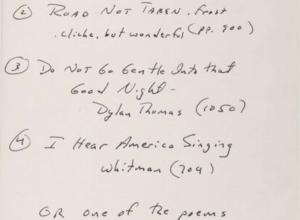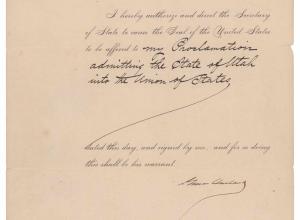Richard III Returns
Typically historical documents aren't seen as quick-turnaround investments, but the confirmation of the discovery of Richard III's bones in Leicester this past February turned that notion, well, on its skull.
Case in point: at an auction in Los Angeles earlier this month, a manuscript letter signed by the short-lived royal monarch sometime in the 1470s, was bid up to $43,681 in extended online and phone bidding (the actual purchase price is $52,417, adding in the 20% buyers' premium). The auction house, Nate D. Sanders, Inc., says it had 13 bids, from the United States and the United Kingdom. The buyer, Nate Sanders said, is from the UK.
As a relatively old and rare object, the price is hardly shocking, especially considering Richard's rarity, and yet, this very same document was last seen at auction only five months ago, at Christie's London on November 21, 2012, when it sold for about $18,000 less (£16,000/$24,150, or £21,250/$33,750 with the 25% premium; our auction columnist Ian McKay covered the sale in our current issue.) Is the five-figure return in such a short period of time due to the recent exhumation and international interest in the king's skeleton?
"He's so rare even without the recent discovery," said Sanders, who agreed nonetheless that this pre-discovery investment proved wise.
 The restored paper document dates to the 1470s when Richard was in his twenties and still the Duke of Gloucester. In the pedestrian letter, he intervenes in a land dispute between the 2nd Earl of Westmorland and his tenants. The letter was once sealed with his signet ring.
The restored paper document dates to the 1470s when Richard was in his twenties and still the Duke of Gloucester. In the pedestrian letter, he intervenes in a land dispute between the 2nd Earl of Westmorland and his tenants. The letter was once sealed with his signet ring.
In better condition, Sanders estimated a Richard III document might sell for as much as $200,000. The scorned king's documents have been scarce at auction. Last year, Christie's estimated that fewer than a dozen early Richard III letters were known, all of them "either in public archives or now untraced."
But with so much media attention focused on the discovery, the DNA evidence, and the debate over where the last king of the Plantagenet dynasty's remains will ultimately rest, will we see more Richard III collectibles surface?
Dickon Dearman, owner of Churchgate Auctions, in Leicester, UK, recently told the Leicester Mercury, "There's certainly been more interest following the discovery, but you'd expect that. When something like this comes into the public eye, people tend to get related items revalued and you find more items are put up for auction. It also has an effect on price - values tend to go up if things become more widely known."
Image: Courtesy of Christie's.
















